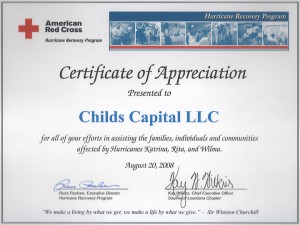This appears to be the year for epic flooding. Rhode Island experienced the worst flooding in 200 years in the spring and many affected businesses have yet to re-open. Tennessee experienced a 1-in-500 year flood event, devastating a good part of the state, including Nashville and the Grand Ole Opry. Germany, the Czech Republic and Poland experienced major floods this year. China’s floods required massive mobilization of public resources. India is underwater and Pakistan’s flooding represents a humanitarian crisis with the very real threat of cholera and other water-borne illnesses. Check out the photographs of the flooding disasters from Asia to Europe here. The tragedies are compounded by the fact the lack of public resources to provide relief aid, as a consequence of a protracted global recession. We should all give whatever we can.
Massive Floods World Wide
August 24th, 2010Unemployment Continues to Rise
August 19th, 2010The number of people filing first-time unemployment claims last week rose to 500,000, a level not seen since last November and well above the expectations of most economists. But the true number of unemployed Americans may be much worse than even the grim data of the U.S. Department of Labor indicate. TechnoMetrica Market Intelligence, which conducts polls for major new media such as Investors’ Business Daily, has expressed skepticism about the official unemployment numbers. In its latest poll, TMI found that 28.6% of households surveyed have at least one member who is out of work, which translates to an unemployment rate of over 22%, well above the official 9.5% unemployment rate. The Bureau of Labor Statistics tabulates the total unemployment rate at 16.5%.
The largest source of the discrepancies between official and unofficial numbers is likely the number of people who are underemployed with part-time jobs or temporary positions for which they are overqualified. According to the Department of Labor, 8.6 million Americans fall into this category. Indeed, a Pew Research survey found that more than half of workers had suffered a decline in their income. The “discouraged unemployed”, those who have exhausted their allotted unemployment benefits or who have given up working, also contribute to the undercounting. Whichever measure you use to capture the data, the unemployment rate continues to be unacceptable. Had policymakers focused on supporting the traditional engine of job growth, small businesses, rather than the big bailout strategy, we would be in a different place.
Red Cross Assesses 2005 Hurricane Response
August 18th, 2010As we approach the fifth anniversary of Hurricane Katrina, the American Red Cross is sharing its lessons learned in a report Bringing Help, Bringing Hope: The American Red Cross Response to Hurricanes Katrina, Rita and Wilma. With $2.2 billion in donor funds, the Red Cross provided shelter and emergency financial assistance to evacuees across thirty-one states and the District of Columbia. This assistance reached 1.4 million families or 4.5 million people, nineteen times the Red Cross’ previous record of outreach. The unprecedented scope and scale of the relief effort prompted the Red Cross to enhance planning for large-scale disasters and created new partnerships at the local, state and national levels. The Red Cross also established a national warehouse system, stocked with more than twice the amount of disaster relief supplies previously kept in inventory – enough to support 35,000 shelter residents. The number of trained disaster volunteers was increased from 25,000 to nearly 95,000, including nearly 50,000 who are on call to travel to disasters around the country. Finally, the Red Cross created web tools to connect families online after disasters. It was an extraordinary response to an unthinkable event. The image here shows the certificate we received from the Hurricane Recovery Director of the American Red Cross for our assistance to affected small businesses. We can all do something and the Red Cross report shows the results of many individual contributions.
Gloom All Round
August 17th, 2010It appears to be a global phenomenon: increasingly downbeat small business owners who see a completely different economy than the one that exists for large corporations. The current monthly survey of small business sentiment conducted by the National Federation of Independent Business states “seventy-three (73) percent of the owners report that the current period is not a good time to expand. Of those, 66 percent cite the weak economy as the main reason, but 18 percent cite the “political climate” as the source of uncertainty. This elevated level of concern has prevailed since January 2008 when Congress began debating the “stimulus” and other possible actions to deal with the economy and the government changed hands. The expiration of the Bush tax program and the implementation of the health care bill represent the two largest tax increases in modern history. Add to that serious talk of a VAT and passing cap and trade. Nothing here to create optimism about the future for business owners or consumers. Top that off with government borrowing of $1.8 trillion last year and $1.5 trillion this year and on into the future, it is no surprise that owners are fearful and pessimistic.” The survey didn’t find concerns about small business access to capital as the most credit worthy businesses are reluctant to assume additional debt: “The saving rate is over six percent, good for the long haul but tough for firms that became accustomed to a “zero” savings rate supported by unsustainable home price appreciation and the borrowing that supported. But most “good” borrowers are on the sidelines, still waiting for a reason to seek a loan and expand their businesses.” To read the report in its entirety, click here.
Compelling Images
August 6th, 2010I was very impressed by ABC’s late night news program “Nightline” in presenting the day’s testimony at The Hague in the war crimes trial of former Liberian President Charles Taylor. Former 1980’s super-model Naomi Campbell testified about the night that Taylor’s staff gave her blood diamonds. ABC News ran her testimony without interruption for the usual talking head commentary giving the viewers the opportunity to form their own opinions. Campbell’s apparent indifference to those who had suffered in Africa was obvious and any attempt to summarize what she had said would detract from the shock value of her actual words. She actually said, “I didn’t really want to be here. I just want to get this over with and get on with my life, this is a big inconvenience for me.” She just exuded her sense of entitlement, dismissing the practice of men giving her gifts all of the time and her thinking nothing of that. The juxtaposition of her physical beauty and her ugly character could not have been more striking. ABC News then showed the video of the next witness to testify against Taylor. After Campbell left the courtroom, dressed in stunning designer clothing, the next witness placed the stubs that remained of his limbs on the table before him and described how he and his family had been mutilated by Taylor’s regime. I have to commend ABC News for letting the viewers see the video footage and keeping the commentary to a minimum. My respect for Mia Farrow, who had reported her conversation with Campbell concerning the diamonds, just jumped. Disaster recovery is a long slow process, but people take longer to heal from acts of man than we do from acts of God. The former are much more traumatic and what could be more painful to the amputee who testified about his suffering than the indifference to his plight exhibited by one of the most privileged women in the world.
Spending Caravan
August 4th, 2010A group of small business owners in St. Louis, Missouri plan a “caravan” across the Gulf Coast traveling from Bay St. Louis, Mississippi as far east as Panama City Beach with stops along Mississippi and Alabama coastal communities, including Biloxi, Gulfport, Pascagoula and Grand Bay. The group plans to spend money at local small businesses at each stop and in the process, create a “Gulf Cara-van Kit” to help other cities recreate their project to aid Gulf Coast communities in their recovery from the losses arising from the oil spill. Group members will blog and tweet about their caravan and have published a site, www.gulfcaravan.com, for more information. Called “tourism with a purpose”, the caravan plans local media events to call attention to the need to support the Gulf Coast. They can look forward to a warm welcome as mayors of several of the communities plan to present the group with keys to their cities. I am planning an event in the Gulf Coast this fall; we should all do what we can to show our support.
Unusual Reality Show
August 3rd, 2010I happened across an unusual television program this evening, Tony Robbins’ Breakthrough, and was drawn in by the conflict immediately presented. Robbins, the famous motivational speaker, presented a family breakdown precipitated by financial strain. The husband had lost the job he had held with his employer of 23 years and then, unable to find comparable employment elsewhere, decided to start his own small business. I won’t spoil it for you, but at the start of the program, the family faced homelessness as the mortgage bank had initiated foreclosure proceedings. The husband’s business had not been able to sustain the family’s lifestyle. It appears that the loss of assets, more than the loss of income, caused the strain, as the couple emptied their 401k retirement savings to start the business.
I am of two minds on this matter: I believe we need to start teaching entrepreneurship in the schools. Our educational system produces graduates for the corporate sector who know how to tick the boxes, study for the tests and pass through the grades. That may have worked when a compliant workforce that was corporate-ready was called for. But if we are to have any hope of at least matching our parents’ standard of living, let alone earning our way out of debt, we need growth and entrepreneurship. But the skills one needs to be a practitioner in a large organization are not the same as the skills one needs to run a business. The television program Robbins presented was powerful for the raw emotions elicited by the financial strain of the married couple. The husband’s self-esteem had taken a beating for his business failure and the wife found herself unable to cope. Our policymakers need to look at strategies for economic growth, which is not the same thing as this piecemeal effort by the states to promote self-employment as an act of desperation. The pain of these poor choices made an otherwise difficult television program impossible to turn off.
Photographing Assets
July 30th, 2010As I look forward to August, I am planning to update my digital photographs and video records of key assets. Digital images help to document hard-to-value assets, such as artwork, for example. I generally use the month of August to get caught up on all of my nagging chores, because most people I need to see are on vacation, so little gets done during this month. It seems that everything is in freeze-frame as we wait to resume normal activity after Labor Day. But particularly with this severe heat and humidity, I’d rather stay indoors and put my home and office in order. Then I can make a fresh start in autumn.
In addition to taking digital photographs of new items or updating records for old ones, I will be scanning in and digitizing key documents for online storage. Of course, these files will also be backed up offsite for remote retrieval. I hope I will never need them, but the peace of mind is priceless. I thought of peace of mind today when looking at the newspaper photographs of the wildfires raging in southern California. Everyone always regrets losing precious memories in the form of family photographs. Make sure yours are safely backed up.
Taking My Own Advice
July 29th, 2010I had the unnerving experience of hearing the chirping sound emanating from my UPS (Uninterruptible Power Supply) unit, followed by intense crackling. Fortunately, this was not followed by any equipment malfunctions. An hour later it happened again and then once more by the close of the business day. It turns out that my building was experiencing micro-outages and alternating power surges caused by extreme demand on the grid from air conditioning usage. Without the protection of the UPS unit, my computer would have been fried. My cinema display monitor survived the first two electrical assaults, but capitulated after the third one. Fortunately, the monitor is not damaged; I just need to replace the power cable. I am glad I followed my own advice; protecting sensitive computer equipment with a UPS unit really paid off today.
An Indication That Premiums May Rise
July 28th, 2010In the first edition of Prepare for the Worst, Plan for the Best: Disaster Preparedness and Recovery for Small Businesses (Wiley, second edition paperback, 2009), titled Contingency Planning and Disaster Recovery: a Small Business Guide (Wiley, 2002), I wrote to explain how, in the aftermath of a major disaster, insurance premiums rise. However, large corporations eventually reach their threshold for pain and adopt self-insurance, captive and other programs to reduce their costs (p. 171):
Large corporations will become increasingly unwilling to pay such steep insurance premiums and will develop innovative means of insuring their risks. We have seen this phenomenon before, beginning in the 1980’s with the development of the so-called alternative risk transfer market (ART). ART offered a portfolio of tools by which corporations could transfer their risks by means other than standard commercial insurance programs. One such tool is a captive insurance program whereby large corporations insure their own risks through wholly owned insurance companies. They were typically domiciled offshore, in places such as Bermuda and the Cayman Islands, to benefit from the favorable tax treatment and fewer regulations. Captives allow corporations the benefit of tax-deductible premiums to cover their risks while ensuring that profits on the program remain in-house.
Now, some interesting news from Vermont, the leading jurisdiction with laws friendly to establishing U.S. captive insurers. In the first six months of this year, Vermont licensed 17 new captives, with a great deal of interest reported by hospital groups seeking coverage for their professional medical liabilities and financial services companies that face premium increases for their directors and officers liability coverage.
Many market analysts believe that this is a defensive measure in anticipation of further premium increases, in which case the insurance market, where small businesses have relatively little bargaining power, is about to get tougher for us. As I am an optimist, I would like to believe that as demand declines in the traditional market, as large corporations self-insure through captives, we will benefit from declining premium rates. Indeed, that it what I had argued in the first edition of the book. Unfortunately, the world changed with the 2008 banking crisis. I am with the market analysts on this one; I predict rising insurance rates, so if you have an opportunity to lock in coverage now for a multi-year period, it would probably pay to do so.





